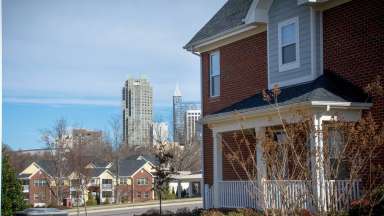Affordable housing is a critical need for the people of Raleigh. In the past year, home prices have risen 22% and apartment rent has increased an average of 14%. Raleigh is working to address housing needs through many programs. The efforts include ways to help homeowners through grants, guidance on tenants’ rights, and affordable housing options.
- Raleigh Evaluates Property Tax Grants for Long-term Homeowners – City Council directed staff to consult with Wake County on how to assist longtime homeowners that may have experienced an increase in their property taxes due to revitalization efforts. Program options have been reviewed, and a work session with Wake County Commissioners will be held on February 28 to determine next steps.
- Tenants’ Rights Handbook provides general information about a tenants’ rights and obligations when renting a home in Raleigh.
- Right to Counsel for Evictions – Right to counsel gives tenants who are facing an eviction proceeding guaranteed legal representation. Due to state legislation, the City of Raleigh does not have the authority to require a tenant’s right to counsel in eviction proceedings. However, Legal Aid of North Carolina offers a variety of free legal services to low-income renters, including matters related to eviction.
- Help for People Impacted by COVID – Legal Aid of North Carolina has partnered with the City and County in providing rent and utility assistance to those impacted by COVID. For households where financial assistance is not enough, Legal Aid provides direct legal assistance to renters with eviction proceedings at the Wake County Courthouse.
- City Purchases Hotel to Provide Permanent Supportive Housing – The City purchased an extended-stay hotel with $8 million in funding from the American Rescue Plan Act. The vision for the property is mixed occupancy, combining the existing extended-stay model with permanent supportive housing and other affordable housing options.
- Right of First Refusal – Due to state legislation, the City of Raleigh does not have authority to require a right of first refusal to mission-oriented buyers when existing affordable housing is being sold. However, when the City is a lender for affordable rental housing development under the Low-Income Housing Tax Credit program, one of the loan terms gives the City the right of first refusal in the event that the borrower wishes to sell or otherwise transfer ownership of the property. The right of first refusal in this scenario protects permanent affordability by enabling nonprofits to buy the buildings for a minimal price at the end of the compliance period.
- Affordable Housing Bond – Raleigh residents approved the Affordable Housing Bond with the highest approval in bond history, with 72 percent voting in favor of the bond. The bond will enrich the lives of residents with household incomes that are 30%, 50%, 60%, and 80% of the Area Median Income (AMI).
- Equitable Development Around Transit – New Bern Avenue is one of four corridors in Raleigh where bus rapid transit (BRT) service will become a reality in the next few years. The City is preserving an affordable housing development on New Bern Avenue. Rental property Duplex Village is comprised of 66 units that were built in 1949. The eastern portion of the site, consisting of 24 units in total, has been purchased by the City for future affordable housing opportunities.
